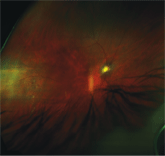High levels of arginase contribute to vascular eye damage and cardiovascular disease. The researchers believe that elevated arginase levels, in fact, might be
a biomarker for retinopathy development.
 |
| Normalization of elevated arginase levels could halt the progression of diabetic retinopathy, as seen in this patient.
Courtesy: Paul Mormon, O.D. |
“[Arginase] is taking L-arginine away from the nitric oxide synthase so it can accelerate wound healing, but the lack of substrate for nitric oxide leads to vascular constriction and occlusion, which causes further tissue damage,” says author Ruth Caldwell, Ph.D.
Co-author Wenbo Zhang, Ph.D., adds, “However, our studies demonstrate that if we inhibit arginase, we also reduce the reactive oxygen species level and vice versa. So, it appears that arginase and nitric oxide synthase influence each other in a positive feedback loop.”
Rather than completely suppress arginase, the authors intend to seek new agents that can normalize elevated arginase levels and stop retinopathy progression. “We need arginase. If we don’t have it, we are in big trouble,” says co-author William Caldwell, Ph.D. “We want to delineate the events that cause [arginase] elevation and limit the elevation to prevent the resulting pathology.”
Zhang W, Baban B, Rojas M, et al. Arginase activity mediates retinal inflammation in endotoxin-induced uveitis. Am J Pathol. 2009 Aug;175(2):891-902.

